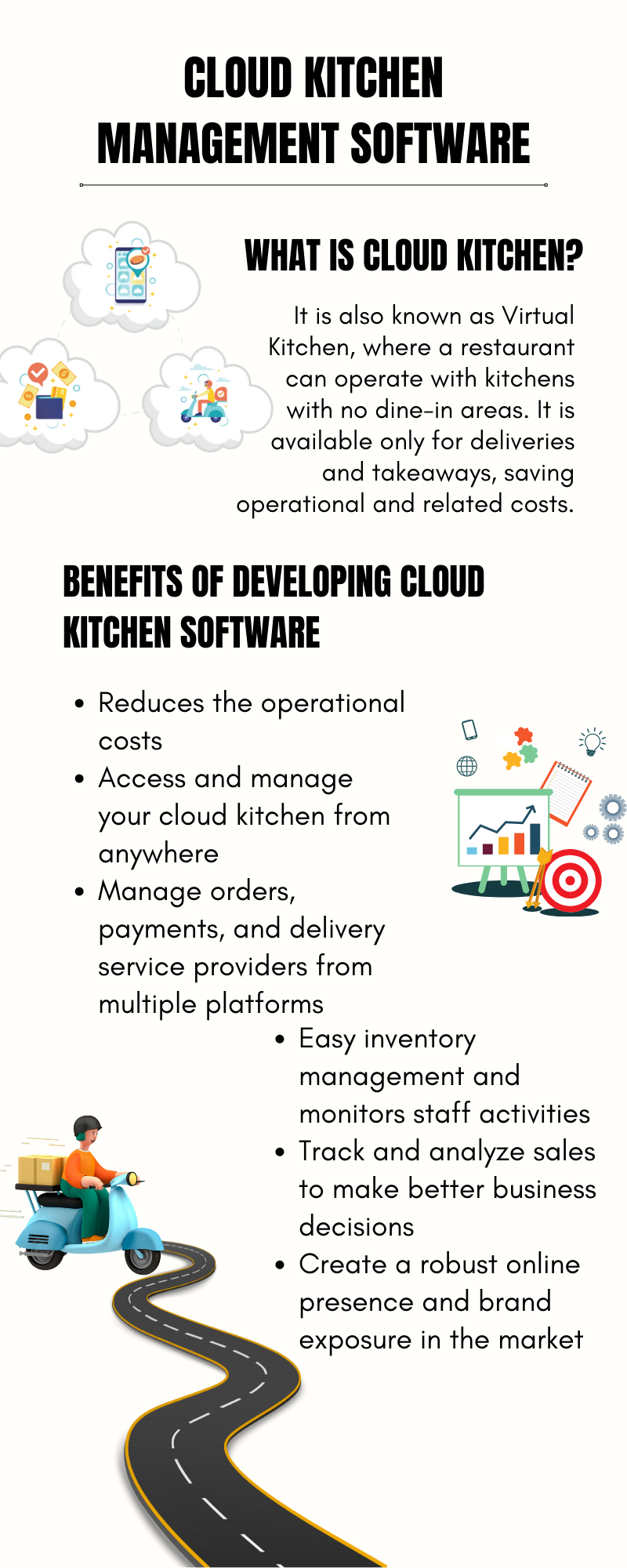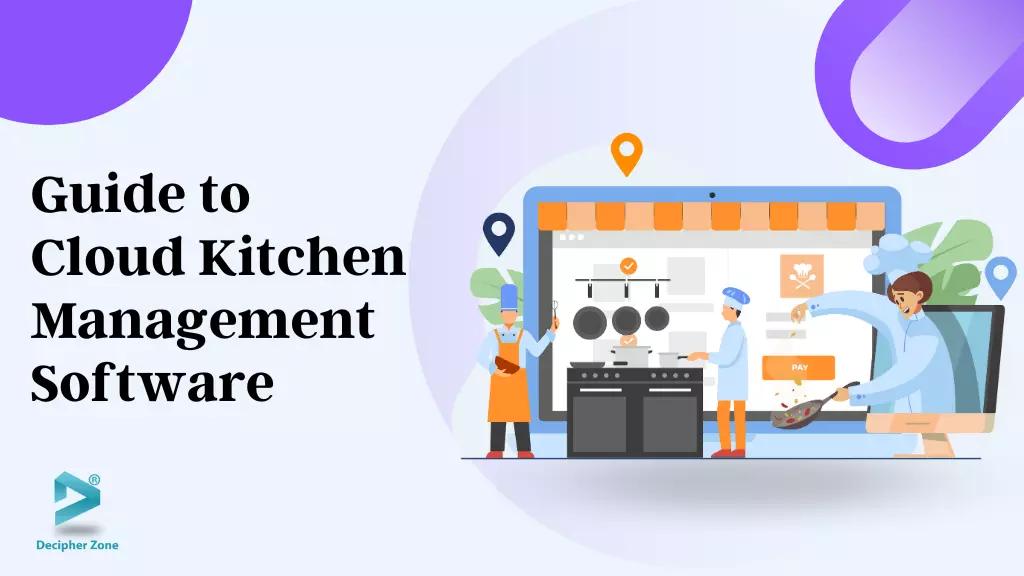What is Cloud Kitchen Management Software and development cost? Why develop Cloud kitchen software? What features should you integrate into cloud kitchen software?
Food is essential for humans to survive, and the amalgamation of technology in this industry has brought the online food industry into existence.
Businesses have witnessed great response and revenue with web apps and software developed to cater to specific needs. And among all, cloud kitchen management software has been a buzzword for the past few years.
This software has helped restaurants to enhance and extend their services at a higher level and has also catered to several other business aspects. However, before briefing them in detail, let us fill you up on the basics first.
What is a Cloud Kitchen Management Software?
Also referred to as Ghost Kitchens or Virtual Kitchens, it is a smart business decision with no fancy infrastructure and no dine-in option but is available only for delivery or takeaways.
Instead, it requires just a space for your kitchen and staff to operate and an application to manage the overall activities seamlessly.
Read: How to Develop Restaurant Management System
It enables restaurateurs to explore new concepts and launch a digital brand in lower-overhead areas, cutting the two significant operational costs, i.e., rent and labor, leveraging the business operations.
Benefits of Cloud Kitchen Software Development
Developing a cloud kitchen software is undoubtedly one of the best business decisions you can consider. It serves the business owner and its customers with innumerable benefits, which are mentioned below for a better understanding.
Read: Restaurant POS System
-
It lets you access and manage your cloud kitchen from anywhere, making it essential to consider developing cloud kitchen management software.
-
It accelerates the sales system by enabling you to manage orders, payments, and delivery service providers from multiple platforms by integrating the available food portals in a single software where your business is open for the users to avail of the services.
-
It also emits the need for paying a commission on each order, which generally the food portals charge from every business.
-
It lets you differentiate the menu's pricing for online and in-store orders. It is also a great marketing strategy that will help generate massive traffic to your web app.
-
Additionally, it helps in easy inventory management and monitors staff activities to streamline the business's workflow.
-
Developing cloud kitchen software also helps you manage takeaways and manually accept phone orders.
-
An added advantage of developing such software is that it helps you to get private consumer feedback, which helps in improving the quality and providing better services.
-
It helps track and analyze sales, consumer behavior, and other helpful information to make better decisions for your business.
-
Also, note that cloud kitchen software development will help you optimize your kitchen operations and manage the outlets efficiently in one place.
-
Another benefit is that it helps you create a robust online presence and brand exposure in the market and is affordable, with lower startup costs and higher profit margins.
-
It also gives you menu flexibility to help reduce food wastage, efficiently use resources, and make changes per customer feedback and demands.
Now that you have the benefits of developing cloud kitchen software, consider the challenges you might encounter.
So, conduct thorough research and perform a SWOT analysis before starting with web app development for your business. It will help you eliminate possible threats and develop a future-proof and competitive application to stand out in the market.
Read: Multi-Vendor Food Delivery System
Choosing the suitable Technology Stack for Cloud Kitchen Software Development
The technology stack is essential to developing cloud kitchen management software, and it is crucial to choose the right one.
Be it accepting orders, processing payments, or managing the content and invoice, the choice of technology should be efficient and capable enough for seamless business operations.
For example, integrating a POS (point of sale) system is a critical requirement that helps manage orders from multiple food delivery channels such as Zomato, Uber Eats, and others.
Read: How to Develop An on-demand Cook Finder Software
Additionally, integrating a Kitchen Display System (KDS) is another tool that will help optimize and ease the order preparation time to ensure faster delivery and enhanced customer satisfaction.
And remember that integrating smart inventory management is also significant to efficiently use the available resources and track daily stock consumption to eliminate wastage and help control costs.
Also, ensure that you integrate security protocols, user authentication, and firewalls to keep the data safe from all possible cyber threats and eliminate unauthorized access.
Read: Why Develop A Delivery Services App for Your Business
Bonus tip: If you are still deciding on what technology stack you should choose to develop your project, then you can schedule a free consultation with us, and we will guide you thoroughly per your requirements.

Features to Consider for Cloud Kitchen Software Development
Features make a brand create a unique identity in the market and stand out to be the best among all. When discussing features, you must integrate them in such a way that it enables a user-friendly experience along with easy browsing capabilities. Some features you can consider incorporating into the software include -
-
Social Media Sign-Up and Login Options
-
Login or Sign-up with Mobile Number via OTP Verification
-
Manage Outlets
-
Staff Management
-
Order Management
-
Schedule an Order
-
Transaction Manager
-
Menu Manager
-
Profile Manager
-
Inventory Management
-
Location Manager
-
Billing and Invoice
-
Reviews and Feedbacks
-
Real-time GPS Tracking
-
Dashboard and Analytics
-
Coupons and Referrals
-
Push Notifications
-
In-built messaging and Call Options
-
WhatsApp integration for improved customer experience
Cloud Kitchen Software Development Cost
Also, note that developing cloud kitchen management software can take up to 2 to 6 months, and the cost of development can range between $30,000 to $80,000, depending on the features and technology stack you choose.
Read: What are the Benefits of POS Software Development
Some other factors that affect the cost include the complexity of the software, number of users, security and third-party integrations, and location and hourly charges of the development company.
Read: eCommerce Platform Development Cost
Wrapping It Up
Developing cloud kitchen management software provides you with a centralized platform, serves you with your business's online ordering outlet, and enables business operations with precision.
If you have a business idea or are in the food and beverage industry, consider developing cloud kitchen management software to skyrocket your business.
So, why wait?
FAQs: Guide to Cloud Kitchen Management Software Development
What is Cloud Kitchen?
It is also known as Virtual Kitchen, where a restaurant can operate with kitchens with no dine-in areas. It is available only for deliveries and takeaways, saving operational and related costs.
What are the benefits of developing cloud kitchen software?
The benefits of developing cloud kitchen software are -
-
It enables managing orders from different channels in one place.
-
Saves infrastructure costs.
-
Helps in customer relationship management.
-
Reduces dependencies on third parties.
-
It helps in reducing food wastage and many more.
How much does it cost to develop cloud kitchen management software?
The cost of developing cloud kitchen management software may range from $30,000 to $80,000 and even more sometimes, depending on several factors like the features and complexity, the technology stack, time of development, and location and hourly charges of the developers.

